Unit 2 Topic 1 You should brush your teeth twice a day Section A课件(共28张PPT)
文档属性
| 名称 | Unit 2 Topic 1 You should brush your teeth twice a day Section A课件(共28张PPT) | 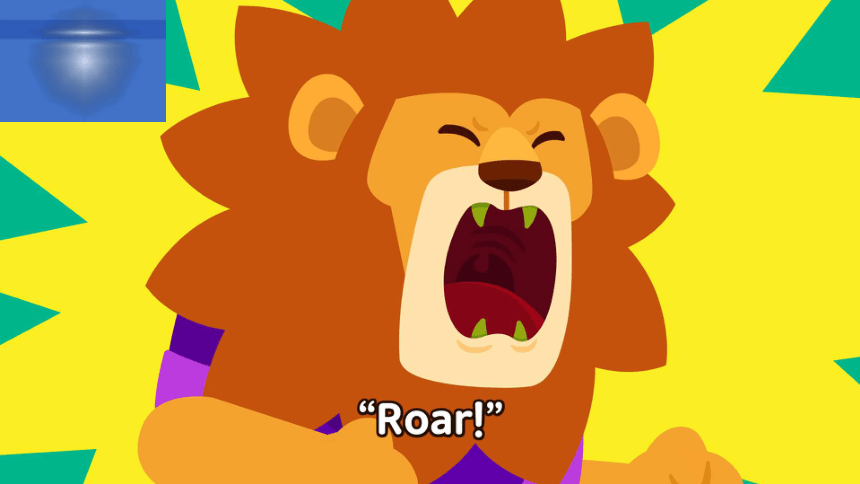 | |
| 格式 | pptx | ||
| 文件大小 | 79.0MB | ||
| 资源类型 | 试卷 | ||
| 版本资源 | 仁爱科普版 | ||
| 科目 | 英语 | ||
| 更新时间 | 2022-09-19 23:23:25 | ||
图片预览

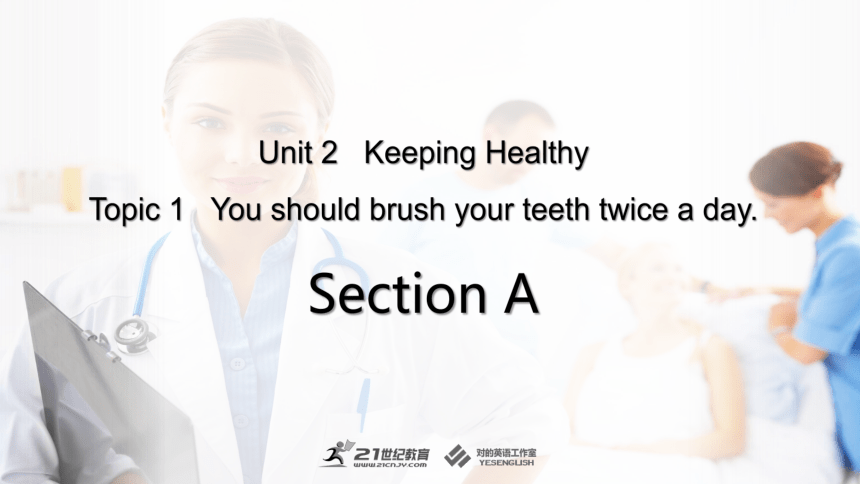

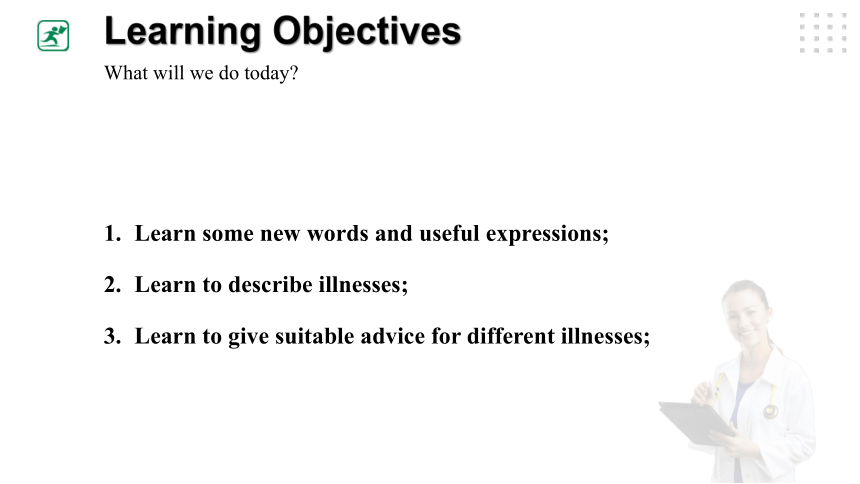



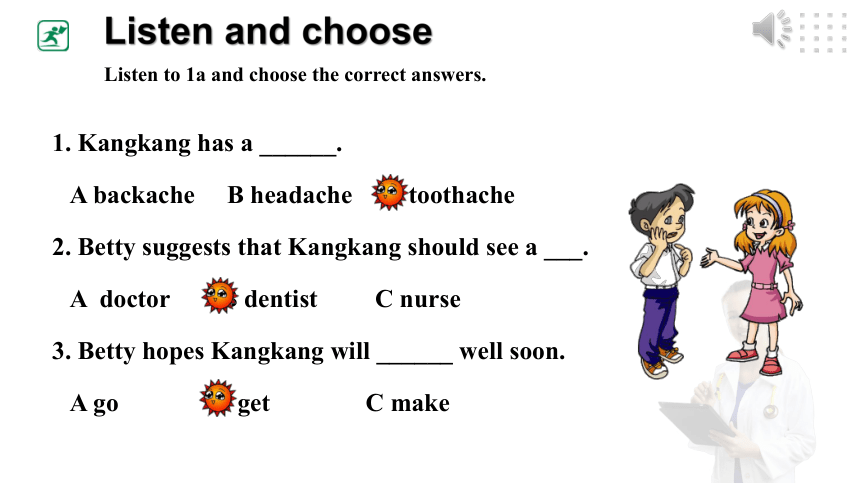
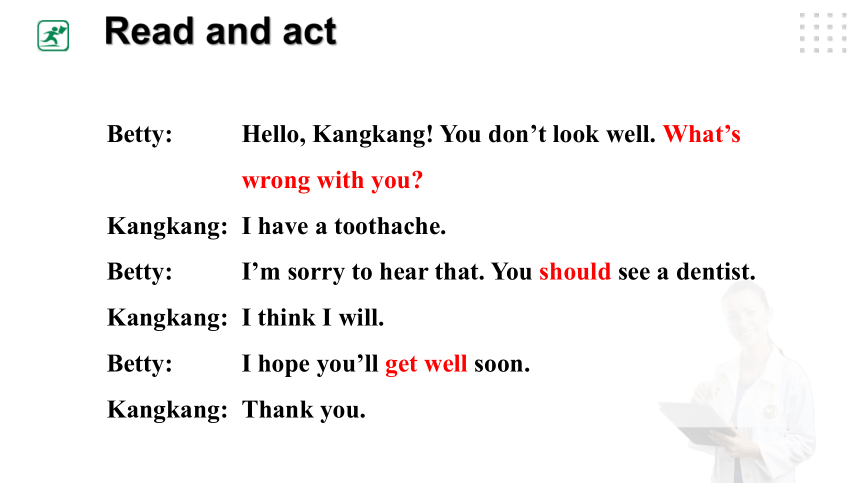
文档简介
(共28张PPT)
Look and learn
Unit 2 Keeping Healthy
Section A
Topic 1 You should brush your teeth twice a day.
Answer
Enjoy the video again and answer the following questions.
1. What happened to the lion, the hippo and the rabbit
4. When do we need a dentist
3. What’s the meaning of the word “dentist”
2. What does the rabbit suggest the lion and the hippo to do
There is something wrong with their teeth.
To see a dentist.
To see a dentist.
When we have a toothache.
Learning Objectives
What will we do today
Learn some new words and useful expressions;
Learn to describe illnesses;
Learn to give suitable advice for different illnesses;
Look and learn
Look at the pictures and learn some new words and useful expression.
A: What’s wrong with her
B: She has a headache.
A: What’s the matter with him
B: He has a backache.
toothache
stomachache
toothache
stomachache
headache
backache
practice
Ask and answer using the following new words.
a cold
a fever
a cough
Listen and number
Listen and number the pictures. Then ask and answer with your partner.
4
1
3
5
7
6
2
Listen and choose
Listen to 1a and choose the correct answers.
1. Kangkang has a ______.
A backache B headache C toothache
2. Betty suggests that Kangkang should see a ___.
A doctor B dentist C nurse
3. Betty hopes Kangkang will ______ well soon.
A go B get C make
Read and act
Betty:
Kangkang:
Betty:
Kangkang:
Betty:
Kangkang:
Hello, Kangkang! You don’t look well. What’s wrong with you
I have a toothache.
I’m sorry to hear that. You should see a dentist.
I think I will.
I hope you’ll get well soon.
Thank you.
Watch and understand
Key points
1. What’s wrong with you =what’s the matter with you
你怎么了?
2. You should see a dentist.
should/shouldn’t 应该/不应该
E.g.: 我们应该吃多点水果。
你不应该在这里吸烟。
We should eat more fruits.
You shouldn’t smoke here.
Look and learn
Look at the pictures and learn some new words and useful expression.
Jane often works too late.
When she feels tired, she likes drinking coffee or tea.
Maybe she will have a ________.
headache
Look and learn
Look at the pictures and learn some new words and useful expression.
In China, it’s normal to drink boiled water around the year.
If you feel sick and go to see a doctor, you can't miss the advice to "drink more _____ _____and you'll be fine."
boiled
water
Free talk
What do you suggest Jane to do
She had better / should / …
complete
Complete the sentences with the phrases in the box. Then practice with your partner.
I have a headache.
I have a fever.
I can’t sleep well at night.
I have a backache.
You should ___________________________.
You should ___________________________.
You shouldn’t _________________________.
You shouldn’t _________________________.
drink coffee or tea in the evening
drink enough boiled water
lift heavy things
stay in bed and have a good sleep
drink coffee or tea in the evening
drink enough boiled water
stay in bed and have a good sleep
lift heavy things
Listen and number
Listen to the conversations and the pictures.
2
1
3
Listen and write
Listen again and then write down the advice, using should / shouldn’t.
1.____________________________________
2.____________________________________
3.____________________________________
You shouldn’t read in the sun.
He should see a doctor.
You shouldn’t eat too much.
Read and learn
Read the conversations and learn new words.
A: What’s the matter with you
B: I have sore eyes.
A: You shouldn’t read in the sun.
B: I think you’re right.
A: What’s wrong with him
B: He has a fever.
A: He should see a doctor.
B: I think he will.
A: What’s the matter
B: I have a stomachache..
A: You shouldn’t eat too much.
B: Yes, you’re right.
Enjoy the video
What will dentists, Juny and Tony do with the three animals’ teeth
Summary
We learn:
Some new words and useful expressions:
toothache, headache, backache, stomachache, fever, cough,
dentist, suggest, coffee, tea, enough, boiled, lift
have a toothache / fever / …
We can:
1. describe illnesses;
2. give suitable advice for different illnesses;
Exercises
have a stomachache _____
2. have a fever ______
3. take a rest ________
4. have a toothache_____
5. have a cold _______
6. see a doctor _____
7. 你应当早点上床睡觉。 _____________________
8. 你妈妈看起来气色不太好。___________________
9. 你应该多喝水。 ________________________
10. 你怎么啦 ____________________________
胃痛, 肚子疼
发烧
休息一下
牙痛
患感冒
看医生
You should go to bed early.
Your mother doesn’t look well.
You should drink more water.
What’s wrong/the matter with you
Homework
Read the conversations aloud and fluently and finish the workbook. ( Levels A, B & C)
Make a long conversation based on what you learnt today. ( Levels A & B )
Try to search for more words and expressions about illnesses.(Level A)
Optional:
Read the passage: Why is boiled water China's go-to beverage
https://www.21cnjy.com/help/help_extract.php
Why is boiled water China's go-to beverage
In China, if you feel sick and go to see a doctor, you can't miss the advice to "drink more boiled water and you'll be fine."
And on your way home, if you stop at a restaurant and ask for a cup of water to quench your thirst, you'll mostly get hot liquid.
Is that odd No, Chinese drink boiled water not only when they feel sick, but even during summer almost every day.
Why are Chinese devoted boiled water drinkers
From: https://news.cgtn.com/news/3d3d774e7a59444d7a457a6333566d54/index.html
Why is boiled water China's go-to beverage
Chinese drank ice water in the ancient times
A Japanese monk, Ennin (793-864AD), who came to China during the Tang Dynasty (618-907AD), found in Shandong Province that local folks only ate cold food and distinguished guests were treated the same way.
This was due to the shortage of fuels including wood and charcoal.
Yingzheng, the First Emperor of Qin Dynasty (221-207BC), started the first centralized empire in China in 221BC. While the agricultural sector developed, the population also increased sharply, leading to the expansion of farmlands.
A large number of wooden buildings and iron along with low efficiency and a high cost of charcoal also led to a shortage of charcoal for heating.
The shortage of fuels, however, brought out a new business -- teahouses in the Song Dynasty (960-1279AD). Tea businessmen would deliver boiled water to one house after another every day. But many people only bought the water when there was someone sick or bought only for the elderly and children as a result of the high expense.
People in the early Qing Dynasty (1644-1912AD) would put alums in ice water so as to disperse impurities, but they didn't notice that the practice didn't work.
Why is boiled water China's go-to beverage
Microbiology makes Chinese begin to drink boiled water
At the end of the 1880s, microbiology was introduced to China from the Western countries and Japan. But it wasn't until the 1910s that microbiology was officially valued.
The government felt obliged to advise people to drink boiled water to avoid unnecessary diseases.
In the 1920s, the Beijing Police Bureau urged folks that cold water from wells should be boiled to kill most of the germs. In the 1930s, the military forces were not allowed to drink raw and cold water. At the same time, the Ministry of Health suggested that people in China should not drink cold water.
In more developed cities like Shanghai, many people began to abandon cold water, following the development of boiled water houses. But most poor people living in the rural areas still drank cold water.
According to a survey from a scholar studying the transformation of Chinese society, there were only two thermos bottles in eleven villages in 1930, and in 1946, the number was 18 for 2,595 families.
Why is boiled water China's go-to beverage
Boiled water became a go-to beverage in the 1990s
It became more common to see people drink boiled water after 1949 when the People's Republic of China was founded. The government appealed constantly for people to drink boiled water instead of cold water in promotion via health books in rural areas.
In the cities, boiled water departments were founded in many companies and institutions. Citizens bought boiled water through a ticket. In rural areas, boiled water was supplied in public canteens for a short time (1958-1960), as a result of the decline of malaria and diarrhea. Though the advice was later withdrawn, the idea of drinking boiled water was deeply ingrained in people's minds.
From the 1970s to 1990s, a large number of biogas digesters, which convert bull and pig waste to a clean gas that can be pressurized, were built to enable cooking and the boiling of water.
As the economy in China developed sharply, people's awareness of health strengthened and nationals came to believe that boiled water is an important beverage for health and fitness.
In Chinese medicine, boiled water is believed to be almost without germs and viruses.
Look and learn
Unit 2 Keeping Healthy
Section A
Topic 1 You should brush your teeth twice a day.
Answer
Enjoy the video again and answer the following questions.
1. What happened to the lion, the hippo and the rabbit
4. When do we need a dentist
3. What’s the meaning of the word “dentist”
2. What does the rabbit suggest the lion and the hippo to do
There is something wrong with their teeth.
To see a dentist.
To see a dentist.
When we have a toothache.
Learning Objectives
What will we do today
Learn some new words and useful expressions;
Learn to describe illnesses;
Learn to give suitable advice for different illnesses;
Look and learn
Look at the pictures and learn some new words and useful expression.
A: What’s wrong with her
B: She has a headache.
A: What’s the matter with him
B: He has a backache.
toothache
stomachache
toothache
stomachache
headache
backache
practice
Ask and answer using the following new words.
a cold
a fever
a cough
Listen and number
Listen and number the pictures. Then ask and answer with your partner.
4
1
3
5
7
6
2
Listen and choose
Listen to 1a and choose the correct answers.
1. Kangkang has a ______.
A backache B headache C toothache
2. Betty suggests that Kangkang should see a ___.
A doctor B dentist C nurse
3. Betty hopes Kangkang will ______ well soon.
A go B get C make
Read and act
Betty:
Kangkang:
Betty:
Kangkang:
Betty:
Kangkang:
Hello, Kangkang! You don’t look well. What’s wrong with you
I have a toothache.
I’m sorry to hear that. You should see a dentist.
I think I will.
I hope you’ll get well soon.
Thank you.
Watch and understand
Key points
1. What’s wrong with you =what’s the matter with you
你怎么了?
2. You should see a dentist.
should/shouldn’t 应该/不应该
E.g.: 我们应该吃多点水果。
你不应该在这里吸烟。
We should eat more fruits.
You shouldn’t smoke here.
Look and learn
Look at the pictures and learn some new words and useful expression.
Jane often works too late.
When she feels tired, she likes drinking coffee or tea.
Maybe she will have a ________.
headache
Look and learn
Look at the pictures and learn some new words and useful expression.
In China, it’s normal to drink boiled water around the year.
If you feel sick and go to see a doctor, you can't miss the advice to "drink more _____ _____and you'll be fine."
boiled
water
Free talk
What do you suggest Jane to do
She had better / should / …
complete
Complete the sentences with the phrases in the box. Then practice with your partner.
I have a headache.
I have a fever.
I can’t sleep well at night.
I have a backache.
You should ___________________________.
You should ___________________________.
You shouldn’t _________________________.
You shouldn’t _________________________.
drink coffee or tea in the evening
drink enough boiled water
lift heavy things
stay in bed and have a good sleep
drink coffee or tea in the evening
drink enough boiled water
stay in bed and have a good sleep
lift heavy things
Listen and number
Listen to the conversations and the pictures.
2
1
3
Listen and write
Listen again and then write down the advice, using should / shouldn’t.
1.____________________________________
2.____________________________________
3.____________________________________
You shouldn’t read in the sun.
He should see a doctor.
You shouldn’t eat too much.
Read and learn
Read the conversations and learn new words.
A: What’s the matter with you
B: I have sore eyes.
A: You shouldn’t read in the sun.
B: I think you’re right.
A: What’s wrong with him
B: He has a fever.
A: He should see a doctor.
B: I think he will.
A: What’s the matter
B: I have a stomachache..
A: You shouldn’t eat too much.
B: Yes, you’re right.
Enjoy the video
What will dentists, Juny and Tony do with the three animals’ teeth
Summary
We learn:
Some new words and useful expressions:
toothache, headache, backache, stomachache, fever, cough,
dentist, suggest, coffee, tea, enough, boiled, lift
have a toothache / fever / …
We can:
1. describe illnesses;
2. give suitable advice for different illnesses;
Exercises
have a stomachache _____
2. have a fever ______
3. take a rest ________
4. have a toothache_____
5. have a cold _______
6. see a doctor _____
7. 你应当早点上床睡觉。 _____________________
8. 你妈妈看起来气色不太好。___________________
9. 你应该多喝水。 ________________________
10. 你怎么啦 ____________________________
胃痛, 肚子疼
发烧
休息一下
牙痛
患感冒
看医生
You should go to bed early.
Your mother doesn’t look well.
You should drink more water.
What’s wrong/the matter with you
Homework
Read the conversations aloud and fluently and finish the workbook. ( Levels A, B & C)
Make a long conversation based on what you learnt today. ( Levels A & B )
Try to search for more words and expressions about illnesses.(Level A)
Optional:
Read the passage: Why is boiled water China's go-to beverage
https://www.21cnjy.com/help/help_extract.php
Why is boiled water China's go-to beverage
In China, if you feel sick and go to see a doctor, you can't miss the advice to "drink more boiled water and you'll be fine."
And on your way home, if you stop at a restaurant and ask for a cup of water to quench your thirst, you'll mostly get hot liquid.
Is that odd No, Chinese drink boiled water not only when they feel sick, but even during summer almost every day.
Why are Chinese devoted boiled water drinkers
From: https://news.cgtn.com/news/3d3d774e7a59444d7a457a6333566d54/index.html
Why is boiled water China's go-to beverage
Chinese drank ice water in the ancient times
A Japanese monk, Ennin (793-864AD), who came to China during the Tang Dynasty (618-907AD), found in Shandong Province that local folks only ate cold food and distinguished guests were treated the same way.
This was due to the shortage of fuels including wood and charcoal.
Yingzheng, the First Emperor of Qin Dynasty (221-207BC), started the first centralized empire in China in 221BC. While the agricultural sector developed, the population also increased sharply, leading to the expansion of farmlands.
A large number of wooden buildings and iron along with low efficiency and a high cost of charcoal also led to a shortage of charcoal for heating.
The shortage of fuels, however, brought out a new business -- teahouses in the Song Dynasty (960-1279AD). Tea businessmen would deliver boiled water to one house after another every day. But many people only bought the water when there was someone sick or bought only for the elderly and children as a result of the high expense.
People in the early Qing Dynasty (1644-1912AD) would put alums in ice water so as to disperse impurities, but they didn't notice that the practice didn't work.
Why is boiled water China's go-to beverage
Microbiology makes Chinese begin to drink boiled water
At the end of the 1880s, microbiology was introduced to China from the Western countries and Japan. But it wasn't until the 1910s that microbiology was officially valued.
The government felt obliged to advise people to drink boiled water to avoid unnecessary diseases.
In the 1920s, the Beijing Police Bureau urged folks that cold water from wells should be boiled to kill most of the germs. In the 1930s, the military forces were not allowed to drink raw and cold water. At the same time, the Ministry of Health suggested that people in China should not drink cold water.
In more developed cities like Shanghai, many people began to abandon cold water, following the development of boiled water houses. But most poor people living in the rural areas still drank cold water.
According to a survey from a scholar studying the transformation of Chinese society, there were only two thermos bottles in eleven villages in 1930, and in 1946, the number was 18 for 2,595 families.
Why is boiled water China's go-to beverage
Boiled water became a go-to beverage in the 1990s
It became more common to see people drink boiled water after 1949 when the People's Republic of China was founded. The government appealed constantly for people to drink boiled water instead of cold water in promotion via health books in rural areas.
In the cities, boiled water departments were founded in many companies and institutions. Citizens bought boiled water through a ticket. In rural areas, boiled water was supplied in public canteens for a short time (1958-1960), as a result of the decline of malaria and diarrhea. Though the advice was later withdrawn, the idea of drinking boiled water was deeply ingrained in people's minds.
From the 1970s to 1990s, a large number of biogas digesters, which convert bull and pig waste to a clean gas that can be pressurized, were built to enable cooking and the boiling of water.
As the economy in China developed sharply, people's awareness of health strengthened and nationals came to believe that boiled water is an important beverage for health and fitness.
In Chinese medicine, boiled water is believed to be almost without germs and viruses.
同课章节目录
- Unit 1 Playing Sports
- Topic 1 I'm going to play basketball.
- Topic 2 I'll kick you the ball again.
- Topic 3 The school sports meet is coming.
- Unit 2 Keeping Healthy
- Topic 1 You should brush your teeth twice a day.
- Topic 2 I must ask him to give up smoking.
- Topic 3 Must we exercise to prevent the flu?
- Unit 3 Our Hobbies
- Topic 1 What's your hobby?
- Topic 2 What sweet music!
- Topic 3 What were you doing at this time yesterday
- Unit 4 Our World
- Topic 1 What's the strongest animal on the farm?
- Topic 2 How can we protect ourselves from the eart
- Topic 3 The Internet makes the world smaller.
